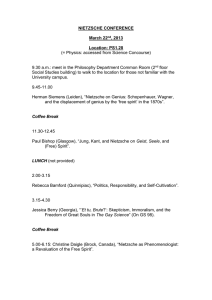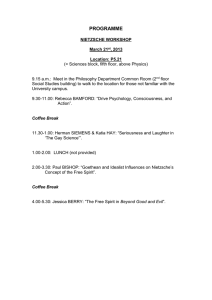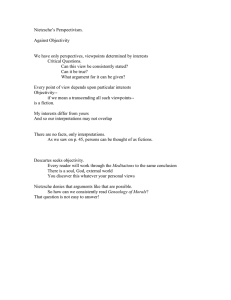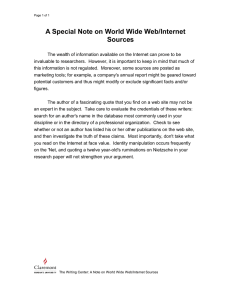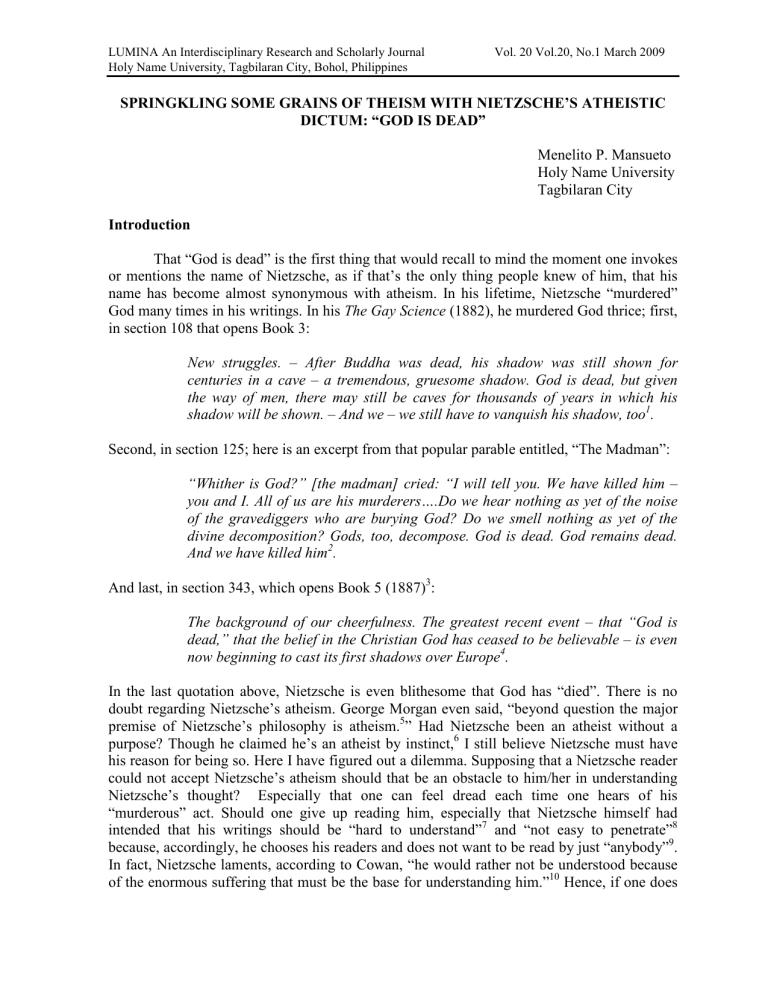
LUMINA An Interdisciplinary Research and Scholarly Journal
Holy Name University, Tagbilaran City, Bohol, Philippines
Vol. 20 Vol.20, No.1 March 2009
SPRINGKLING SOME GRAINS OF THEISM WITH NIETZSCHE’S ATHEISTIC
DICTUM: “GOD IS DEAD”
Menelito P. Mansueto
Holy Name University
Tagbilaran City
Introduction
That “God is dead” is the first thing that would recall to mind the moment one invokes
or mentions the name of Nietzsche, as if that’s the only thing people knew of him, that his
name has become almost synonymous with atheism. In his lifetime, Nietzsche “murdered”
God many times in his writings. In his The Gay Science (1882), he murdered God thrice; first,
in section 108 that opens Book 3:
New struggles. – After Buddha was dead, his shadow was still shown for
centuries in a cave – a tremendous, gruesome shadow. God is dead, but given
the way of men, there may still be caves for thousands of years in which his
shadow will be shown. – And we – we still have to vanquish his shadow, too1.
Second, in section 125; here is an excerpt from that popular parable entitled, “The Madman”:
“Whither is God?” [the madman] cried: “I will tell you. We have killed him –
you and I. All of us are his murderers….Do we hear nothing as yet of the noise
of the gravediggers who are burying God? Do we smell nothing as yet of the
divine decomposition? Gods, too, decompose. God is dead. God remains dead.
And we have killed him2.
And last, in section 343, which opens Book 5 (1887)3:
The background of our cheerfulness. The greatest recent event – that “God is
dead,” that the belief in the Christian God has ceased to be believable – is even
now beginning to cast its first shadows over Europe4.
In the last quotation above, Nietzsche is even blithesome that God has “died”. There is no
doubt regarding Nietzsche’s atheism. George Morgan even said, “beyond question the major
premise of Nietzsche’s philosophy is atheism.5” Had Nietzsche been an atheist without a
purpose? Though he claimed he’s an atheist by instinct,6 I still believe Nietzsche must have
his reason for being so. Here I have figured out a dilemma. Supposing that a Nietzsche reader
could not accept Nietzsche’s atheism should that be an obstacle to him/her in understanding
Nietzsche’s thought? Especially that one can feel dread each time one hears of his
“murderous” act. Should one give up reading him, especially that Nietzsche himself had
intended that his writings should be “hard to understand”7 and “not easy to penetrate”8
because, accordingly, he chooses his readers and does not want to be read by just “anybody”9.
In fact, Nietzsche laments, according to Cowan, “he would rather not be understood because
of the enormous suffering that must be the base for understanding him.”10 Hence, if one does
LUMINA An Interdisciplinary Research and Scholarly Journal
Holy Name University, Tagbilaran City, Bohol, Philippines
Vol. 20 Vol.20, No.1 March 2009
not belong to his “kinship” – probably, an atheist, at that – one shall never be able to
understand him. Kaufmann hits it bull’s eye when he wrote that Nietzsche is “the most
misunderstood of all writers”.
OVERVIEW
Moving on, I shall defend a view that Nietzsche’s philosophy, despite being known to
be largely atheistic, does not at all preclude an idea or a conception of a God – in a good sense
of that. And so it follows that in understanding Nietzsche, one does not necessarily have to
give up one’s belief in God, because in spite of Nietzsche’s atheistic claim, Nietzsche, too,
simultaneously, can appear as a theist. What I shall do henceforth is to sneak in a conception
of God through a backdoor amidst Nietzsche’s atheistic claims, and will try to describe what
image of God would emerge. Though it can be so lenient and unusual, I ask the reader to
permit this little experiment, after all, every person has his own understanding and conception
of God – no one can dictate that to him – just as every religion does. The objective behind is I
want to ward off the bias in understanding Nietzsche’s thought. For such a bias could deter
one from reading and understanding a great mind (and soul, too) in the twentieth century
philosophical thought. I declare that although Nietzsche is against Christianity, he is never
totally against God. This will serve as an invitation to look at Nietzsche’s thought from the
perspective in the opposite side of the spectrum: Nietzsche as theist.
I shall first establish Nietzsche’s merit as an atheist philosopher for us to understand
why so narrow and confined a conception of God that will prevail later on. This will be
discussed in three parts, namely: (1) Nietzsche’s view on the “metaphysical need” of man; (2)
his view of morality; and (3) his concept of the “amor fati.”
NIETZSCHE’S MERIT AS AN ATHEIST
For more than a century now after his insanity and death, one cannot deny that
Nietzsche remained a very interesting and influential thinker of the twentieth century, ranging
his influences from the literature to the philosophical arena, despite his atheistic stance on
various subjects. Often regarded to be a precursor of the twentieth century in the sense that he
anticipated what is now part of the consciousness of every thinking man and woman. From
his atheistic standpoint, Nietzsche could bring his reader a tour on various aspects regarding
man’s religiosity, morality, and life.
(1) Nietzsche’s View on the “Metaphysical Need” of Man
This is Nietzsche’s view of man that one can find in section 347 of his The Gay
Science, it reads as follows: “For this is how man is: An article of faith could be refuted
before him a thousand times – if he needed it, he would consider it ‘true’ again and again.”11
Here, Nietzsche speaks of the “metaphysical need” of man. He argued that man needed a faith
to “flourish”. A faith that is “firm” because man “clings to it” and that he does not want to be
“shaken”. In fact, according to Nietzsche, this faith becomes the measure of man’s strength12.
Why Nietzsche wishes to deny man his God is obvious – he wants to see man, the faithful,
crumble into his feet. For, according to Nietzsche, what was once regarded as man’s strength
LUMINA An Interdisciplinary Research and Scholarly Journal
Holy Name University, Tagbilaran City, Bohol, Philippines
Vol. 20 Vol.20, No.1 March 2009
was actually man’s “weakness.” Will, for Nietzsche, is “the affect of command” and the true
measure of power and strength. And accordingly, the lesser one knows how to command, the
more, the urgently one covets someone who “commands severely” – i.e. a [God]. Thus, faith
in God is regarded by Nietzsche as a “disease of the will” and a sort of “hypnotism of the
senses and intellect.” And he regards religion as a form of “fanaticism.”13 Nietzsche
concludes, “Once a human being reaches the fundamental conviction that he must be
commanded, he becomes ‘a believer’.”14 In this, faith in God is considered by Nietzsche as a
psychological condition that was sought for a metaphysical solution by regarding it a “need”
and a “disease of the will” with God as the ultimate solution.
(2) Nietzsche’s View of Morality
This is Nietzsche’s view of morality that one can find in section 260 of his Beyond
Good and Evil. Here, he distinguishes two basic types of morality, viz.: the master morality
and the slave morality, which are radically opposed to each other.15
The master morality, on one hand, represents those of the master race, the ruling
tribes, the aristocrats and the noble castes. The slave morality, on the other hand, represents
those of the ruled group, the slaves, the dependents of every degree. Nietzsche traces his
observation from the ancient tribes and takes note of how the concepts “good” and “bad”, in
contrast to, “good” and “evil” has evolved from these two different moralities.
Being in a position of power and in the highest order of rank, the masters when they
determine what is “good” do so by referring to themselves and their qualities, such as,
strength, power, happiness, beauty, health, etc. And to raise themselves by distinction above
others, the masters regard those who differed from them as “bad.” “The exalted ones,”
describes Nietzsche, “are experienced as conferring distinction and determining the order of
rank.” The noble human being separates from himself those in whom the opposite of such
exalted, proud states finds expression: he despises them.”16 The masters feel contempt for the
“bad” ones, those who are “cowardly”, “anxious”, “the suspicious with their unfree glances”,
“those who humble themselves”, “those who allow themselves to be maltreated,”17 and etc.
Nietzsche says that in this first type of morality, the opposition of “good” and “bad” means
approximately the same as “noble” and “contemptible”.
By contrast, the oppressed group, the slaves have regarded the virtues of the powerful,
of the masters as hostile and unfavorable. The slaves, then, come to see the masters as “evil”.
And Nietzsche claims that by judging the masters as “evil”, only then that the slaves have
come to regard themselves as “good” – in the negative sense of lacking the masters’ “evil”
traits. One should notice the transition from “good” and “bad” to “good” and “evil”.
Nietzsche adds that in slave morality, to have inspired fear is regarded as “evil”, while in
master morality, it is “good” to inspire fear, while it is “bad” to be contemptible.18 The
mechanism behind this slave orientation, according to Nietzsche, is motivated by what he
calls “ressentiment.” It is a form of defensive mechanism rooted in revenge, envy and
hatefulness which “becomes creative”19 by reversing the values of the powerful: “master
values turned upside down to become vices, master misfortunes then turn into virtues.”20 It
follows therefore that the very qualities which were condemned by the masters as “bad”, such
LUMINA An Interdisciplinary Research and Scholarly Journal
Holy Name University, Tagbilaran City, Bohol, Philippines
Vol. 20 Vol.20, No.1 March 2009
as, pity, sympathy, humility, patience, kindness, warm-heartedness, and etc. were considered
good virtues by the slaves for these are, Nietzsche says, the most useful qualities and virtually
the only means of enduring the burden of existence.
Nietzsche, however, pointed out that these two moralities can dwell together “within a
single soul”, within the same person at the same time.21 In his On the Genealogy of Morals,
Nietzsche furthers his analysis, of how ressentiment – that instinct for revenge “turns inward”
and develops into what he calls a “bad conscience”22. And of how “bad conscience gave birth
into a God by way of having projected someone who could free them from their sufferings –
they illusion a God.23
Nietzsche makes fun of comparing the slaves into a “herd”. Like herd-animals, slaves
herd themselves into groups that need to be commanded like a sheep who follows other sheep.
Nietzsche also refers to the master as “beasts of prey.” Similarly, the Scripture, particularly
the New Testament, often refers to the faithful as “a flock”, with God as their shepherd. There
is no surprise that Nietzsche would be inclined to suggest that Christian morality is
“inherently structured as a form of slave morality.”24 Characterizing man as a herd-animal,
“tame”, “sickly”, and “weak”, Nietzsche has come to regard morality as a disguise, a shield, a
weapon against the ferocious “beasts of prey”. A passage in Nietzsche’s Thus Spoke
Zarathustra will best capture this point: “I have often laughed at the weaklings who thought
themselves good because they have no claws”25. Instead of revealing oneself as a weak
creature without claws, “one pretends that one is ferocious and that only a high regard for
morality” can keep foes from doing terrible things26.
(3) Nietzsche’s Concept of “Amor Fati”
The year before his collapse in 1889 in a street in Turin and to which later recovered
but was then diagnosed of a “general paralysis of the insane”, Nietzsche amazingly completed
six books in one year despite a “continued ill health and excruciating physical pain”27 due to
an infection of syphilis28. And as to how has he endured living that kind of life, his answer
was simple: “what does not kill me makes me stronger”29. This could mean the manner he
“cure” his illness is through work. In other words, sickness did not stop him, it even
compelled him to work.30
This shows how relevant is Nietzsche’s own life in understanding his conception of
“amor fati” because it should be understood, too, what kind of life Nietzsche had lived, in
which case, a life of “day-to-day” battle with illness. He wrote in Ecce Homo: “Never have I
felt happier with myself than in the sickest and most painful periods of my life”31. Amor fati is
from Latin which literally means “love of fate”. Or simply said, it is a person’s love of one’s
life, with all its defects, it’s “flaws”, just for what it is32.
To add impact on this, I include Nietzsche’s “doctrine” of the eternal recurrence of the
same events. In the section 341 of The Gay Science, Nietzsche asks the reader to imagine
what if one day or night a “demon” would appear to him/her in his/her loneliest hour and say.
“This life as you now live it and have lived it, you will have to live once more and
innumerable times more; and there will be nothing new in it, but every pain and every joy and
LUMINA An Interdisciplinary Research and Scholarly Journal
Holy Name University, Tagbilaran City, Bohol, Philippines
Vol. 20 Vol.20, No.1 March 2009
every thought and sigh and everything unutterably small or great in your life will have to
return to you, all in the same succession and sequence – even this spider and this moonlight
between the trees, and even this moment and I myself. The eternal hourglass of existence is
turned upside down again and again, and you with it, speck of dust!”33 Then, Nietzsche goes
on by asking the reader what would be his/her response to it- see yourself if you pass this
psycho-test!
Normally, when one is asked if given the chance to live one’s life again, responses
will vary such as having a different kind of life, or, to a sort of a revised version of that life.
But, to live again an exactly the same life as one had already lived, down to its tiny details
again and again. – takes enough courage to give a positive response, honestly!
Indeed, a daring ‘Yes’ could serve as a testimony of how much one considers one’s
own life as valuable, meaningful, and worthy of living it over and over again.34 Nietzsche
considers this doctrine of eternal recurrence as the highest affirmation of life, a manifestation
of one’s amor fati.
A firm ‘Yes’ means that one takes one’s own life as it is, because it is actually just
one’s same life posted as another that one has affirmed – a nasty trick! To affirm life means to
accept one’s life as one’s own – that is, to own one’s life. Only then can one be inclined to
live more, to “thirst” more of that life, to keep wanting for that life. Regardless of whether
Nietzsche had seriously believed his theory of the eternal recurrence, one thing certain is that
it provides an “existential imperative”, an existential meaning in every person’s life.
“ALAS, A LIGHT CREEPS IN!”
Now as to whether God could fit in the picture, I shall draw my analysis only from
what I have presented above. First, I shall determine the conception of God to which
Nietzsche abhors, then, based on that, I shall furnish a conception of God to which Nietzsche
cannot possibly abhor; if so, otherwise, I shall find Nietzsche contradicting his own position.
Based on Nietzsche’s view of the “metaphysical need” of man, I presented a view of
God to which Nietzsche considers a fantasy that could redeem man from disgrace; also, a God
which is a healer that alleviates man’s pain and suffering. In short, God is a remedy that heals
or covers up man’s weakness.
In Nietzsche’s view of morality, I presented a view of God to which Nietzsche
considers as a weapon and shield to cover up man’s inadequacies. This includes the view of
God as a defender, protector, and savior that delivers man from harm. Purely conceived, God
as remedy and weapon against man’s weakness only caters man everything that satisfies him
to fill in his inadequacies. Nietzsche contends that such a God, or more precisely, idea of such
a God should be “murdered” for reasons that it makes man dependent and “surrenders his
power to God”35, that such an idea of a God could only make man more helpless and weak. In
short, such a God hinders man from realizing his power inherent in him.
LUMINA An Interdisciplinary Research and Scholarly Journal
Holy Name University, Tagbilaran City, Bohol, Philippines
Vol. 20 Vol.20, No.1 March 2009
Granting that Nietzsche is a devotee of life, I shall then fashion an image of God as the
rightful provider of life. Nietzsche himself says: “I should like very much to do something
that would make the thought of life even a hundred times more appealing to [men].36
Nietzsche even discourages men to think about death. Instead, he encourages men to focus
rather on life alone. Men should live in “haste”, “clamor”, “outshouting”, and “overreaching
each other”, like the “last moment before the departure of an emigrant ship: people have more
to say to each other than ever.”37 That is why Nietzsche’s ultimate models of life are the
Greeks, whom he considered “cheerful” and “passionate” people: “The finest, most beautiful,
most envied race of men ever known, the people who made life seem most seductive….”
If one denies the “God is dead” concept, what probably God could be? A God that
celebrates life? A God that can hardly be murdered precisely for being itself the source of
life?
For this, I take the image of God, the life-giver in the Genesis (2:7), which goes that
from some pieces of clay, God formed man out of it and “he breathed life-giving breath into
his nostrils and the man began to live.” This passage should be taken only metaphorically in a
similar way that Nietzsche’s “God is dead” is also metaphorical. Besides, Nietzsche simply
advocates the “death” of God. Couldn’t it be taken to imply a God that was once “living”?
Here, I employ what I call the analogy of the gift-giver: when a giver wraps his gift
and then give it to the receiver of the gift, the giver at this point detaches himself any
connection to that gift, that it all belongs now to the hands of the receiver – that whatever the
receiver would do to it is now outside of the power of the giver. The giver has nothing more
to do than make his wish that the gift would serve the receiver any good, apart from that,
nothing else. The analogy: is that God, after giving man his life, has bestowed man his
freewill, and had left him alone on his own will and freedom. For that reason, God would not
even desire to be revered as God. God leaves it all alone to man. In fact, Nietzsche wrote: “If
God wished to become an object of love, he should have given up judging…even a merciful
judge is no object of love.” “What? A God who loves men, provided only that they believe in
him….A love encapsulated in if-clauses attributed to an almighty god? If I love you, is that
your concern?” Nietzsche here quotes Goethe’s discussion of Spinoza’s dictum, in the Ethics,
“Whoever loves God must not expect God to love him in return”. Otherwise, God would not
have given to man his freedom. If man does revere God, however, God would still be willing
to accept and appreciate that reverence in any case. This reverence is nothing more than the
recognition of God as the source of one’s life, not out of fear nor indebtedness, as Nietzsche
had supposed38, for God too has freely bestowed this gift of life as a privilege to man. Being
the giver of life, God properly deserves such memory and recognition as one does in
remembering one’s ancestor. Here I have simply done away of the things that could possibly
upset Nietzsche. I got rid of an established religion and have reduced reverence into mere
acknowledgment rather than an admittance of one’s weakness. Now, wouldn’t Nietzsche
accepts an image of God – a God that does not judge nor command, and even more yielding
and forgiving than the Christian God? It should be remembered that Nietzsche did not
construct a philosophical system, hence it is lenient enough to accommodate such a
conception of God.
LUMINA An Interdisciplinary Research and Scholarly Journal
Holy Name University, Tagbilaran City, Bohol, Philippines
Vol. 20 Vol.20, No.1 March 2009
What have I done! I have rescued God under Nietzsche’s knife, at the same time that I
cleansed Nietzsche’s hands, like an angel who appeared and rescued Isaac from Abraham’s
hands. Is it necessarily God’s fault if God’s very own people would misconstrue God? Does
God have a choice (hence, the title) if man would consider God as the solution to his
sufferings? What more could God do supposing that God has created for man the best
possible world that God could ever create – this world which is, yet, unfortunately, known for
being an imperfect world. Can God be the culprit to blame?
An astute reader may be able to refute at once our ardent picture of God as the lifegiver. Here, too, I will refute myself for the reader’s benefit. Supposing that man himself will
find that gift – his own life – as worthless: a life in this world full of struggles and hardships,
with its poverty and pain, will most likely bring one to an exhaustion up to a point of saying:
“I don’t want this life anymore!” and more so: “What kind of God who will give us as a gift a
wicked and cruel life?” – What will be Nietzsche’s answer to that? To the first objection,
surely, I remain firm that it’s still the amor fati – the eternal recurrence of the same events –
which is a constant affirmation and re-affirmation of life in this world, a positive attitude
towards that life. To the second: Life in this world with its opposing features that are
intertwined toward its necessary opposite: joy with pain, triumph with loss, or, what
Nietzsche simply called “the wedding of dark and light”39. “[P]leasure and pain,” wrote
Nietzsche, “were so linked together that he who wants to have the greatest possible amount of
the one must have the greatest possible amount of the other also”40 It should be understood
then that man, having such a condition of life, will naturally feel, just as he could express his
reverence to a God, that he could as well express his irreverence to that same God. These are
all part of life.
I do hope I’ve given a fair treatment in showing the significance of Nietzsche’s denial
of any metaphysical reality, such as the “beyond”, “other world”, “after-world”, “after-life”
and even God, in favor of a concrete earthly existence and life. Nietzsche has sacrificed God
for his love of man. He has denied God to give the “greatest weight” on human life. He might
have realized that the best way to give emphasis on life is to “murder” that very being which
has caused man’s misunderstanding of himself. I say that Nietzsche is not a full-blown atheist
but a full-blown humanist. He wrote in Zarathustra: “I love man” and “I bring men a gift,”41
and, I think, that could sum up his atheism. Lastly, I’d like to take note that the image of God
which Nietzsche rejects is closer to the image of God in the New Testament. For additional
knowledge, Nietzsche has “the highest admiration” to the Old Testament42. A passage in
Section 52 of his Beyond Good and Evil expresses hi s distaste to the New Testament in
preference to the Old Testament: “To have glued this New Testament, a kind of rococo of
taste in every respect, to the Old Testament to form one book…that is perhaps the greatest
audacity and ‘sin against the spirit’ that literary Europe has on its conscience.”
As with regards to my task, I am fully aware how inappropriate it is to ascribe to
Nietzsche what does not belong to Nietzsche. It even amounts to accusing him of the very
things he loathed. But isn’t it equally inappropriate to deny him of such things merely because
he does not have it? And regarding the accusation of Nietzsche’s emerging from the dark side,
I take Henrik Ibsen’s43 words defending Nietzsche in an interview: “Satan – no. No,
LUMINA An Interdisciplinary Research and Scholarly Journal
Holy Name University, Tagbilaran City, Bohol, Philippines
Vol. 20 Vol.20, No.1 March 2009
Nietzsche wasn’t that”44. Nietzsche’s thought has not emerged from the dark side, I have just
shown you how a light creeps in.
Before ending this, I would like Nietzsche to have his final say:
Indeed, people will have trouble understanding us….Who are we anyway? If we
simply call ourselves, using an old expression, godless, or unbelievers, or
perhaps immoralists, we do not believe that this would even come close to
designating us: We are all three in such an advanced stage that one – that you,
my curious friends – could never comprehend how we feel at this point….We
know it well, the world in which we live is ungodly, immoral, “inhuman”; we
have interpreted it far too long in a false and mendacious way, in accordance
with the wishes of our reverence, which is to say, according to our needs….We
are far from claiming that the world is worth less: indeed it would seem
laughable to us today if man were to insist on inventing values that were
supposed to excel the value of the actual world. This is precisely what we have
turned our backs on as an extravagant aberration of human vanity and unreason
that for a long time was not recognized as such.45
Conclusion
These are the conclusions drawn from the preceding presentation: Atheism is
necessary, but not a requirement, in understanding Nietzsche’s thoughts. Nietzsche regards
faith in God as a form of hypnotism and fanaticism. Nietzsche strips off man’s faith in God to
expose his weakness. According to Nietzsche; man’s suffering led to the invention of God.
God is the solution to man’s inadequacies. God is a weapon that covers up man’s weakness.
God makes man dependent and weakens his power. Amor Fati is a person’s love of one’s life,
with all its flaws, just as what it is. According to Nietzsche, the eternal recurrence is the
highest possible affirmation of life and the manifestation of amor fati. Nietzsche is a
philosopher devoted to life. Nietzsche has denied God’s existence to give more value on
human life. A life-giving God, however, is reconcilable into Nietzsche’s thought.
Endnotes
1
Friedrich Nietzsche, The Gay Science, tr. with commentary by Walter Kaufmann
(New York: Vintage Books, 1974), p.167.
2
Ibid., p.181.
3
Book 5 was added to the second edition in 1887.
4
Ibid., p.279.
LUMINA An Interdisciplinary Research and Scholarly Journal
Holy Name University, Tagbilaran City, Bohol, Philippines
5
Vol. 20 Vol.20, No.1 March 2009
George A. Morgan, Jr. What Nietzsche Means (Cambridge: Harvard University
Press, 1941), 36. As quoted in Walter Kaufmann. Nietzsche : Philosopher, Psychologist,
Antichrist, (New Jersey: Princeton University Press, 1974), p.99.
6
“I do not by any means know atheism as a result; even less as an event: it is a matter
of course with me, from instinct. I am too inquisitive, too questionable, too exuberant to stand
for any gross answer. God is a gross answer, an indelicacy against us thinkers – at bottom
merely a gross prohibition for us: you shall not think!” (Kaufmann notes, “Nietzsche’s
atheism is not a ‘result’; it is a corrolary of his commitment to question every conviction,
including his own convictions. In a sense, of course, he does know atheism “as an event”;
namely, as a cultural event which he designated with the words, “God is dead”, what he
means above is that he did not experience the loss of faith in God as an event in his own life:
he did not pass through any crisis of faith.”) Friedrich Nietzsche. Basic Writings of Nietzsche,
Translated and edited by Walter Kaufmann, (New York: The Modern Library, 1992), 692693, 692n. See also Kaufmann, Nietzsche: Philosopher, Psychologist, Antichrist, 100. See
also Jorg Salaquarda, “Nietzsche and the Judaeo-Christian tradition” in Bernd Magnus and
Kathleen M. Higgins, The Cambridge Companion to Nietzsche (Cambridge University Press,
1996), p.93.
7
“I obviously do everything to be ‘hard to understand’ myself.” Friedrich Nietzsche.
Basic Writings of Nietzsche, p.229.
8
“For [my writings] are, indeed, not easy to penetrate.” Ibid., p.458.
9
“It is not by any means necessarily an objection to a book when anyone finds it
impossible to understand: perhaps that was part of the author’s intention – he did not want to
be understood by just ‘anybody’. All the nobler spirits and tastes select their audience when
they wish to communicate; and choosing that, one at the same time erects barriers against ‘the
others’. All the more subtle laws of any style have their origin at this point: they at the same
time keep away, create a distance, forbid “entrance”, understanding, as said above, - while
they open the ears of those whose ears are related to ours.” Nietzsche, The Gay Science,
p.343.
10
Marianne Cowan, Introduction, in Beyond Good and Evil. (Chicago: Gateway
Edition, 1955), p.vi.
11
Nietzsche. The Gay Science, p.287.
12
Ibid., p.287-288.
13
Ibid., pp.289.
14
Ibid.
15
Nietzsche. Basic Writings of Nietzsche, p.394.
16
Ibid.
17
Ibid., pp.394-395.
18
Ibid., p.397.
19
Ibid., p.472.
20
Robert C. Solomon. Cambridge Companion to Nietzsche, p.208.
21
Nietzsche. Basic Writings, p.394.
22
Ibid., p.511.
23
Ibid., p.525.
24
Bernd Magnus and Kathleen M. Higgins. Cambridge Companion, p.49.
LUMINA An Interdisciplinary Research and Scholarly Journal
Holy Name University, Tagbilaran City, Bohol, Philippines
25
Vol. 20 Vol.20, No.1 March 2009
Friedrich Nietzsche. Thus Spoke Zarathustra (New York: The Modern Library,
1995), p.119.
26
Nietzsche. The Gay Science, p.353n.
27
Nietzsche. Basic Writings, p.714n.
28
R.J. Hollingdale. Nietzsche: The Man and His Philosophy. (Cambridge University
Press, 1999), p.30.
29
Ibid., p.55
30
Ibid., p.172. See also ibid., p.118f.
31
Nietzsche. Basic Writings, p.744.
32
Bernd Magnus and Kathleen M. Higgins. Cambridge Companion, p.36.
33
Nietzsche. The Gay Science, pp.273-274.
34
Bernd Magnus and Kathleen M. Higgins. Cambridge Companion, p.37.
35
Eddie R. Babor. “Nietzsche’s Concept of Religious” in Philosophia, International
Journal of Philosophy, (De La Salle University, Vol. 34, 2: 2005), p.169.
36
Nietzsche. The Gay Science, p.278.
37
Ibid.
38
“The fear of the ancestor and his power, the consciousness of indebtedness to him,
increases, according to this kind of logic…. If one imagines this rude kind of logic carried to
its end, then the ancestors of the most powerful tribes are bound eventually to grow to
monstrous dimensions through the imagination of growing fear…in the end the ancestor must
necessarily be transfigured into a god. Perhaps this is even the origin of gods, an origin
therefore out of fear!” Nietzsche. Basic Writings, p.525.
39
Ibid., p.435.
40
R.J. Hollingdale. Nietzsche: The Man and His Philosophy, p.146.
41
Nietzsche. Thus Spoke Zarathustra, p.11.
42
Kaufmann. Nietzsche: Philosopher, Psychologist, p.299.
43
Henrik Ibsen, a Norwegian poet and playwright.
44
Friedrich Nietzsche. The Will to Power (New York: Vintage Books, 1968), pp.5254.
45
Nietzsche. The Gay Science, pp.285-286.
LUMINA An Interdisciplinary Research and Scholarly Journal
Holy Name University, Tagbilaran City, Bohol, Philippines
Vol. 20 Vol.20, No.1 March 2009
Bibliography
Babor, Eddie R. “Nietzsche’s Concept of Religious” in Philosophia: International Journal of
Philosophy. De La Salle University. Vol. 34, 2:2005.
_____________. Introduction, in Ethics: The Philosophical Discipline of Action. Manila: Rex
Book Store, 1999.
Cowan, Marianne. Introduction, in Beyond Good and Evil, by Friedrich Nietzsche. Chicago:
Gateway Edition, 1955.
Hollingdale, R.J. Nietzsche: The Man and His Philosophy. Cambridge University Press, 1999.
Kaufmann, Walter. Nietzsche: Philosopher, Psychologist, Antichrist. 4th ed. New Jersey:
Princeton University Press, 1974.
Magnus Bernd and Kathleen M. Higgins, eds. The Cambridge Companion to Nietzsche.
Cambridge University Press, 1996.
Nietzsche, Friedrich. Basic Writings of Nietzsche, tr. and edited, with Commentaries, by
Walter Kaufmann. New York: The Modern Library, 1997.
________________. The Gay Science, translated, with Commentary, by Walter Kaufmann.
New York: Vintage Books, 1074.
________________. Thus Spoke Zarathustra, translated with a Preface by Walter Kaufmann.
New York: The Modern Library, 1995.
________________. The Will to Power, translated by Walter Kaufmann and R.J. Hollingdale.
New York: Vintage Books, 1968.




